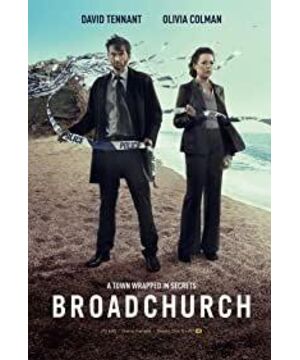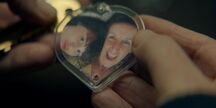In terms of reasoning: The
eight-episode story only tells one case: in the secluded town of Broadchurch, an 11-year-old boy, Danny, was killed on the sunken beach. Sheriff Hardy led the local female police detective Miller in charge of the murder.
It looks boring, doesn't it? So let's look at it this way: Imagine this case as a murder in a secret room. That's right, it's a secret room. This secret room is the entire town. From the very beginning, we knew that people who died in a remote and secluded town were basically locals who committed the crime. The small town is an open secret room, and the suspect is someone in the small town.
Then comes the setting of the suspect. The detective and the police detective are completely different ways of approaching. The policewoman Miller’s method is commonly used by most people: assume that everyone in a specific group of people is irrelevant, and use evidence to determine the suspect; the detective’s method is completely the opposite: assume that everyone is guilty in a specific group of people , To exclude one by one through evidence. I have seen some documentary reports on the detection of real criminal cases. Among the specific groups that have been locked, the criminal police will choose to solve the case by eliminating them one by one. However, if the crime is committed on the fly or at random, this one-by-one method of exclusion is not suitable for primary investigations. The story of this film takes place in a small town with a population of 10,000, and it basically has the conditions to rule out investigation methods one by one.
As the story progressed, the inspector showed us every top-level suspect. Then the next thing to do is to eliminate them one by one. Some people say that they guessed the murderer in the third or even the second episode. This is very simple, I also guessed the murderer in the second episode. However, the police do not rely on guesswork to solve the case. Whether it is the policeman or Sherlock Holmes or Professor Yukawa described by Keigo Higashino, they all have to say "why it is him and not someone else". Reasoning is not guessing. As an audience, if you like reasoning, then follow the clues investigated by Inspector Hardy to think about solving the case. After the sixth episode, I started to entertain myself so much. There were four suspects before me. Then when the No. 1 suspect was excluded, I gave reasons that I thought were convincing enough; in turn, every suspect removed had convincing evidence, and these evidences were mentioned in the first six episodes. . Until the last suspect, I have no valid evidence to eliminate him, so according to the rule of exclusion, he is the biggest suspect, and it is basically certain that he is the murderer.
Some people say that "the story is procrastinated", most of which stems from the interpretation of "irrelevant people". But you have to know that in reality, no one is "irrelevant" in the eyes of the police. Therefore, the most detailed characters will also be displayed in the plot. As the plot develops, the "search" network gradually shrinks, and the rest are the most likely suspects that the inspector thinks. This process seems to be very slow, but I think it is very real.
The audience's self-reasoning process is very interesting, like a guessing, but also an analysis. I am a fan of mystery novels and mystery dramas. After more than ten years of self-entertainment, I think my reasoning ability is still very useful at least when watching new reasoning works. The viewership of this drama in the UK is super high, and the audience discussion on social networking sites is super happy. I think most of the reason is that the plot designed by the screenwriter allows the audience to participate in the reasoning well. Every week, the audience is reasoning and analyzing, and they never get tired of it. From this point of view, this is where this very traditional reasoning drama succeeds.
About the show:
I really want to talk about the performance of the actors, especially the leading actress Olivia Colman. I remember seeing an interview with an actor before. Olivia said that it was really "Bloody hell" to take the show....The actor is a mother and plays a police mother with two children in the play. At the same time, the case she wants to solve is a neighbor. The murder of the family child. She said that as a mother, even if she knew that the plot was fake, she still couldn't help crying sadly while filming. In the final episode, the policewoman Miller stands alone in front of the victim's house. On the empty lawn in the dark, only the victim Danny's mother Beth and Miller face each other. Beth asked: Why could you not know? Miller was speechless, except for tears. When I watch a performance, the first thing I look at is the eyes of the actors. The eyes can express all feelings, even the lines you want to say. Miller's eyes were full of pain, grievance, incomprehension, regret, and guilt. At that moment, through the eyes of the actor, as an audience, I resonated with Miller in a certain way, and I understood the bitterness she couldn't tell. So, I shed tears with her. Just for this scene, I am willing to stand up and applaud the actress.
Let's talk about DT again. As all newspaper media comments: as always good. . . Hey, the word "as always" is quite harmful. The role of Inspector Hardy, until the case is solved, has been monopolizing the first hard-pressed character in the show (after the case is solved, this "honor" will be given to Miller). The previous case tortured him with a heart attack. Throughout the play, the actor has to perform a sickly appearance that requires heart stent surgery, breathing hard, walking tremblingly, and looking trance. Broadchurch's case is a salvation, to his profession, to his soul. In fact, with DT's performance style, he is good at extroverted publicity performances, and the hard-working character of Inspector Hardy requires him to recycle the performance, but it must be just right. This may also be a test for the actors themselves.
I really like the teasing of the last two people sitting on the bench by the sea. Miller is going to go to another country to start life again with his children. The detective said that he was going to retire (the most important thing he needs after the salvation is a heart stent operation). Then Miller smiled bitterly and said: Look at us, the desolation of the two former police officers. . . Silent freeze frame, on the seaside of the night, in the distance are torches lit by people for the dead. These two people are really good partners, so I really hope that the two leading actors can come back in the second season~~~~~
Finally, let’s talk about the crew: if you are a fan of British dramas, read the list of creators (writers, directors) , Starring), you will understand that this is obviously the re-assembly of some of the cast and crew of Doctor Who~~~~~ That’s right, the screenwriter Chris is still writing the script for the seventh season of DW.
View more about Broadchurch reviews











